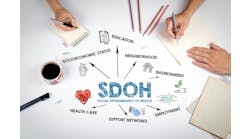The community information exchange (CIE) movement continues to grow across the country. Michelle Tucker, president and CEO of the United Way of Greater St. Louis, recently called the Greater St. Louis CIE, a game-changer. “Because we accelerated the rollout of CIE due to COVID, nearly 15,000 people were helped through CIE by early 2022,” she said in a recent interview with St Louis Magazine.
Tucker described the CIE as an integrated technology platform “and a way for a network of resources and partners in that community to coordinate the services for a person who calls in with a slate of issues. We’re able to probe further and better assess the immediate and long-term needs of a person. So often when a person calls 211 or reaches out for support, they don’t typically present with just one issue. If they say, ‘We need food,’ then chances are there’s another situation unfolding. They are probably under- or unemployed.”
“This allows us to make a fuller assessment and focus on the whole person as we intake on the hotline,” Tucker told the magazine. “What we’re then able to do is coordinate multiple services and make sure the caller or client is connected to our resource network. Right now, we have nearly 200 partners that are part of this network. We can take a wraparound approach to helping the person, so it’s not just “Give them food” and assume the challenge is resolved.”
The St. Louis CIE, led by the United Way, aims to become the regional coordinated entry system that connects client data across health and social service providers.
According to its website, the St. Louis Regional Data Alliance (RDA) is part of the CIE leadership team, which also includes BJC HealthCare and Washington University alongside the United Way.
The RDA also said it was developing draft open data standards to facilitate data sharing across providers — an effort funded by Data Across Sectors for Health (DASH), an initiative of the Robert Wood Johnson Foundation. These open standards seek to align existing data types like the HL7 / FHIR standards for electronic health records, the HUD / HMIS data type for homeless services, and the Human Services Data Specification for referrals.
In St. Louis, 2-1-1 serves as the backbone for the greater St. Louis CIE and Connection Center, helping link St. Louisans to participating CIE agencies.
The larger Unite Missouri is a coordinated care network of health and social service providers. Partners in the network are connected through vendor Unite Us’ shared technology platform, which enables them to send and receive electronic referrals, address people’s social needs and improve health across communities. Unite Missouri is sponsored by Cync Health and Mercy. The United Way of Greater St. Louis is a strategic partner of the network. The network is supported by a Missouri-based Unite Us team focused on community engagement, network health and optimization, and customer success.
Tucker told St. Louis Magazine that basic needs and wraparound supports are areas of strong focus. “We’re seeing families needing help with bringing together the income or the support necessary to pay rent or stabilize their housing. Especially through COVID—COVID compounded what was already challenging. Nearly 43 percent of families across the region struggle at some point to meet basic needs on a monthly basis,” she said. “We are also focused on jobs and workforce development. Mental health is definitely a concern. When we think about what we’re seeing across the country, our community is not immune to what is happening.”


